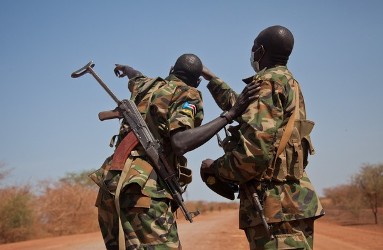SPLA accuses Sudan army of attacking its positions in Upper Nile
February 2, 2013 (JUBA) – A soldier from the South Sudanese army was killed in Upper Nile state in an alleged ground and air attack by the armed forces of neighbouring Sudan on Saturday, the Southern military said.

According to Aguer, the early morning ground attack, which was repulsed by the SPLA forces of Division One, took place between the areas of Babanis and Algoli, in to which the attackers later retreated.
However, following the retreat of the SAF ground forces, he said the Sudan army launched air attacks from 10:30am using helicopter gunships against SPLA positions 21kms deep inside the territory of South Sudan.
The attacks left one soldier dead and three others wounded, he said, adding that
thousands of civilians, including women, children and the elderly have been forced to leave their homes, according to the military and other local authorities.
The SAF “went and regrouped and came [back] at 10am but they were again pushed away”, Aguer said in a statement broadcast on state-owned South Sudan Television (SSTV).
Aguer pointed out that the Sudanese war planes flew over at around 12:00pm noon time to provide cover.
The military officer said South Sudan’s army was capable of defending the territorial integrity of the country but it would wait for a political decision before deciding on what further measures to take.
South Sudan seceded from Sudan in 2011 but tensions between the two nations almost triggered a border conflict in April last year. A 2005 peace deal allowed South Sudan to opt for independence, but many other aspects of the deal, such the status of disputed areas and demarcation of the border have not yet been fully implemented,
The two sides signed a deal in September last year that would have allowed South Sudan to resume oil exports – stopped a year ago over a transit fee dispute – and create a demilitarised buffer zone on the tense border.
But implementation of the deal has stalled over security issues, with Sudan accusing the South of backing its former comrades from the civil war north of the border in South Kordofan and Blue Nile – both of which border Upper Nile state.
“This is the third time the Sudanese armed forces have carried out the attack in [Upper Nile state]. They came on 26 December 2012 to kidnap farmers and took away all personal belongings including sorghum. They went and came again two weeks later. Now they came today”, he further said.
Khartoum consistently says that it does not bomb Southern territory, although it does attack rebels as they move from South Sudan across the border. Juba denies backing rebels from the Sudan People’s Liberation Movement-North (SPLM-N) in Blue Nile and South Kordofan states, which in 2011 formed a coalition with the main Darfur rebel groups.
Upper Nile state’s minister of information, Philip Jaden, confirmed the attack and said the Southern government “unequivocally condemned” the act on its territory and called on the international community to hold Sudan responsible for the killing. He said that crossing into the territory of another sovereign state was a violation of international law.
Jaden further added that the state government considered Saturday’s attack as a violation of not only the September agreement but also the non-aggression pact the two sides signed in 2012, preventing the two armies from carrying out attacks or providing support to rebels on either side of the border.
“The Security Council of the United Nations should come out clearly and hold the government of Sudan responsible for such provocative behaviour. The intention of Sudan is to return the two countries to war. The response of the United Nations should, therefore, not just be condemnation but it must roll out clear action plans and take serious measures against the government of Sudan”, Jaden told Sudan Tribune on Saturday.
South Sudan’s minister of information and broadcasting Barnaba Marial Benjamin said he was still waiting for a full report from the state authorities but that the “unprovoked act” and “unacceptable”.
“We have not received [a] full report from the state but we are not surprised at the behaviour of the government of Sudan. We are dealing with unprovoked attacks targeting mainly civilian population in areas deeply inside [the] territory of a sovereign country. Such acts blatantly violates the international law and sovereignty of another country and is unacceptable”, Marial said.
The government’s official spokesperson also did not say whether his country would respond to the attack, but said the country has the territorial right to “defend its sovereignty and its land”.
(ST)
